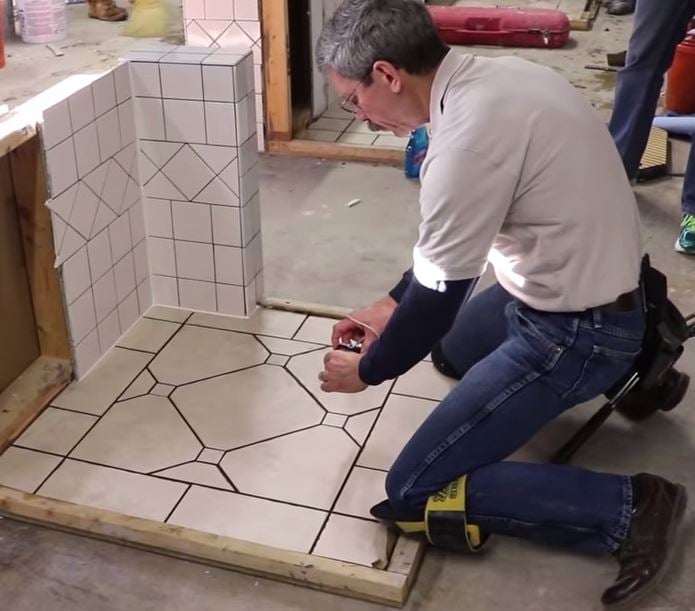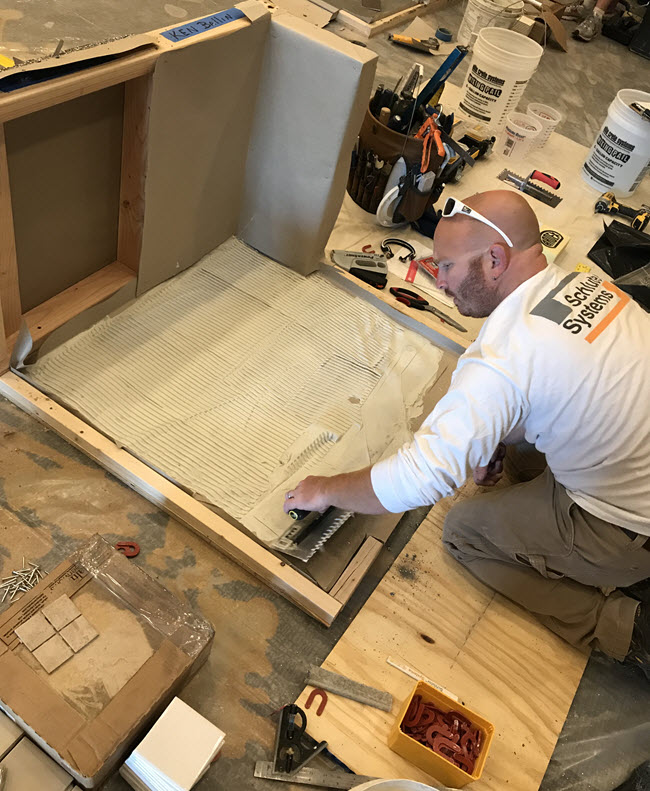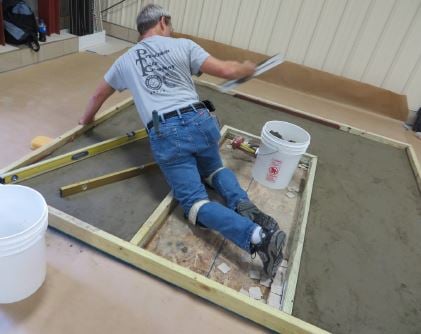
Do you have questions about the CTI and the ACT certification programs?
The blog article titled "Should Tile Installers Become Certified?" generated robust conversation on the CTEF Facebook page when it was published. It also raised questions that need to be addressed about the qualifications for:
- The Certified Tile Installer (CTI) program
- The Advanced Certifications for Tile Installers (ACT) program.
In this article, we'll highlight specific portions from the Facebook conversation while Scott Carothers addresses the following questions:
1. Does being a CTI make a tile installer better than one who isn't a CTI?
2. Is taking the CTI at 45 worthwhile?
3. Why do some sloppy CTI test modules pass?
4. What About Grinders During the Test?
6. Should the CTI cover a county license?
7. Why should tile installers obtain certifications?
8. Can you apply tile installation standards in the real world?
9. Should there be a rank in the CTI Program?
10. Is the CTI Hands-on test antiquated or out of date?
If you have additional questions about these tile installation certifications, be sure to add them in the comments section.

10 Questions About CTI & ACT Certifications and Qualifications
1. Does being a CTI make a tile installer better than one who isn't a CTI?
Here are some of the comments on this topic:
Scott Rice: I'm on the fence as well.
I'm not certified but I take every opportunity that I can to educate myself on all aspects of flooring. And no I still don't know it all. Been a business owner for 15 years and have hired more than a handful of CTI card holders and only 2 or 3 were even able to do a job without me being on site but means in no way that that's ever one of them. I have met some that blew me away with knowledge and skills. it's a coin toss. Hell, I don't think there is a right answer. If you’re a cardholder I say congratulations but make sure you price accordingly on your real skills and not just on the fact you have a card.
George H. Maneira: I still haven't been convinced being a CTI is important.
I know CTIs that can't do 1/4 of the stuff I can do and because they passed the CTI test they are using that as a way to justify their work and think that being a CTI gives them an advantage... Erroneously... I know too many guys like me that can work circles around some of these "CTIs".
Now if we're talking about ACT I feel that would be important to learn and do.
That is the direction I'm going in and the union (local 7 in my area) will be doing ACT certifications.
Scott Responds
While it may be true that some CTIs do not possess a skill set covering every aspect of tile installation as others say they should, the CTI test does determine if the testing installer utilizes the abilities and knowledge required to meet tile industry standards and best practices.
The CTI test was launched in April of 2008 and established this statement:
“Certification is the validation of the skills and knowledge of the men and women who presently are installing tile successfully in the United States”.
Additionally, the CTI program was not designed to be a training vehicle for persons who desire to enter the tile trade.
Conversely, it was developed to test the attributes of existing tile installers who want to establish their level of proficiency. However, a significant number of installers have said that after completing their study of the CTI Manual, the TCNA Handbook, and ANSI Specifications in preparation for the CTI test, they didn’t know that some of the methods they had been using to install tile were incorrect.
From their study, they gained valuable insight into the proper methods and have put them into daily use in their businesses.

Mike Sima CTI #1254 Adds Perspective
(Also see Mike Sima CTI #1254 Holds Himself to Higher Tile Installation Standards)
Mike Sima: Damn George, I didn't realize you had such a strong opinion about us CTI guys not being as good as you.
Time and experience grow knowledge. If you are keeping up to date with all the changes and staying informed about ever-evolving methods and products then you will always have an advantage. For guys who are younger than you and who have not had a mentor show them the old-school ways doesn't mean they are not as good as you but that guys like you have not taken the time to mentor anyone to be as good as you.
They also have not been exposed to many old-school methods because they got in the trade when the new products were out. A guy with 5 years doing Schluter only would be just as good at that system as a guy with 5 years only doing mud would be at that system. It doesn't mean he knows less....he just knows different.
I wasn't born when they drove horse and buggies...I had a car when I first started being mobile. Does that mean I didn't know how to operate on the roads? Or wasn't as good as the guy with his horse and buggy? I think not.
Everyone is at a different stage in the journey. We only make the trade better by helping others. Not talking down to them.
George H. Maneira: Mike Sima I have no problem with anyone being a CTI or the CTI itself, it's a basics skills test, like a high school diploma a lot of people who think they're "installers" learn, quickly, they ain't shit when they take it...
The CTI test for me at 56 is useless if in all the years I've been installing I couldn't install a 6x6 4x4, 8x8 with my eyes closed I would have never got to the level of installations I'm at now. I would have been "outed" by now. So why would I need it?
I could have used it 20 years ago...
ACT on the other hand is something that has a tangible value and I can make a difference in helping others learn some of the skills needed for those. The skills needed for the ACT tests are way above and beyond the CTI test.
I've never had anyone work for me that wanted to learn "the old ways" you mention...
I on the other hand prefer to use modern materials and techniques because those "old ways" f*ck your body up and now I'm more into preserving these older bones, not destroying them more.
Scott Carothers responds:
The “old ways” of tile installation are the bedrock of what is seen in today’s market. Without these established methods and materials, the tile and installation products we now see would not exist.
Additionally, it is true that some of the new products are easier to use than others, this transition is borne out of installer creativity which is a win-win for both the installer and the tile-consuming public -offering time savings without sacrificing quality.
As was stated above, the CTI was established to determine if the installer has what it takes to meet tile industry guidelines and it is a stepping stone to the next level. That next level in the ACT.
Note - From Bullnose to Metal Transition Profiles: CTI Hands-On Test Evolves
Erin Albrecht from J&R Tile Adds Perspective
(See
>> J&R Tile's Erin Albrecht Talks Tile in a Tiny House
>> How To Differentiate Your Business With Tile Installation Certification.)
Erin Albrecht: George H. Maneira then why follow CTEF?
George H. Maneira: Erin Albrecht for me it's the common sense aspect. If it makes sense, do it.
The whole pebbles in shower pan and how much pitch to leave is one rule I don't agree with and don't follow.
Scott Carothers Addresses Shower Pan Slope
Realize that neither the CTEF nor the CTI are responsible for the parameters for slope in a shower pan. This and many others, which are utilized by tile installers, are not a requirement of the tile industry, but rather, a requirement from the plumbing code.
In the case of shower pans, the plumbing code calls for the slope to drain to be a minimum of ¼” per foot and a maximum of ½” per foot. Whether it makes sense or not to the installer is irrelevant, it is the code that must be followed.
Back to Erin and George
Erin Albrecht: George H. Maneira but what is your intention? Following CTEF on social media (a nonprofit to support our trade), when you don’t agree with it, then criticize/comment?
George H. Maneira: Erin Albrecht I'm giving my opinion about the content, or is that not that permitted anymore?
I didn't know having an opinion was a crime...😂
Scott Carothers Responds
Having an opinion is appropriate and comments are always welcomed by CTEF. This type of conversation is what fosters growth and development.
Back to Erin and George
Erin Albrecht: I am still curious what your intention and purpose is.
- Voice your opinion?
- Self-promotion?
- Discredit the organization?
It appears you want to be involved professionally in the industry. Simply saying, perhaps getting involved and being a part of the solution. I am for one partly with what you’re saying, I am one of the big supporters who believe that continuing education hours should be mandatory every year to keep your certification. I think that’s a start.
We have ACTs because that proves to us, at least down here in Texas, that we are union equivalent where the union does not exist. You are a sharp guy, put that energy toward creating solutions.
George H. Maneira: Erin Albrecht I am, in the union.
Up here the union being "the professional entity" needs to be part of the solution.
I had this discussion at today's union meeting, either they take the forefront up here or they won't like what happens when contractors do it because then the need for the union won't be there anymore...
Shit or get off the pot kind of scenery is how I painted the picture for them.
I don't know if they will move quickly enough for me, or if they are being run by an older more follow-the-rules kind of people who will just stand by and be passed by for their lack of effort.
Erin Albrecht: George that is every organization with leadership, with fixed mindsets. Different worlds. Our team took ACT testing next to union installers and have strong opinions. But then again, people ask us frequently if we are a union shop here in San Antonio. I consider that a complement, we are all speaking the same language and on the same page.
Scott Carothers Responds
The CTEF has not and does not work against organized labor.
The ACT testing program was born out of a collaboration between the CTEF and the IUBAC along with the International Masonry Institute (IMI), the National Tile Contractors Association (NTCA), the Tile Contractors Association of America (TCAA), and the Tile Council of North America (TCNA).
Also, CTEF tests both open shop and organized labor installers. A review of the CTEF website will demonstrate this to be true.
2. Is taking the CTI at 45 worthwhile?
Jay Eric: I went for it at 45 George and didn't finish. I had a wall left to do and no sleep beforehand; was same week we closed on our house, but I can confidently say my cuts and quality looked better than some that finished for sure and even a few that passed. I'm fine with knowing I tried it and may again just to know I did it.
Scott Responds
Jay Eric, congratulations on your desire and tenacity to take the CTI tests at 45!
I would encourage you to consider testing again when the time is right.

3. Why do some sloppy CTI test modules pass?
Anthony Tolomello: George H. Maneira I agree with George. I respect the test and the guys that took it but let's be honest would a customer pay you for the way half the modules look like?... just because they finished in a certain timeframe and material adhered correct.. I'm sure it's more to it but I've seen some Modules that look like sh*t and the guys passed... so your telling me that a client should choose that guy over me because hes cti?... where as for myself im up to date with most of the new materials and methods and have done alot of high end work all over manhattan but a guy thats cti hasnt touched a 1/3 of what ive done should be hired over me??.. i dont think that test proves much in the real world and just another gimmick of an agency taking money from guys to be honest sorry if i sound like an a*hole lol
Scott Responds
The CTI was developed to set a benchmark for installer abilities and knowledge that meet the tile industry methods and standards. It combines the TCNA Handbook details of B415 for a wet wall which requires 95% mortar coverage and F144 for a dry floor tile installation which requires a minimum of 80% mortar coverage. All aspects of the test are based on these details and other ANSI requirements.
>> See The TCNA Handbook for Ceramic, Glass, and Stone Tile Installation
>> See ANSI Standards: A Tile Installer's Best Friend!
The CTI test was not designed to be a comprehensive assessment of every skill the installer possesses, but rather a well-designed determination of the basic skills and knowledge of existing tile installers.
The ACT tests build on the CTI base and expand the testing to include task-specific work which is a part of tile installation. These tests include:
- Large Format Tile and Substrate Prep,
- Membranes,
- Mud Floors,
- Mud Walls,
- Shower Receptors,
- Grouts, and
- Gauged Porcelain Tile (GPT).
4. What About Grinders During the Test?
Jay Eric: While this debate ensues it's billed as an equalized test for standards but at what point have they factored in the variation of no grinders now versus in the past? That alone negates older guys to the new standard test. Especially with the time constraints given. It's also in your interest to verify the plumbness of the module which they assemble and all vary. That and the way sites are limited in space vary as well. X number of guys crammed into x sq ft of space all rushing along.
Scott Responds
The decision to ban the use of angle grinders from the CTI test was driven by the OSHA requirements that were implemented on September 23, 2017.
The CTI test is the same as a job site, so the rules had to be accepted and included in the testing program. Our goal is to protect the installer and those standing nearby from the effects of airborne silica.
The CTI test is exactly like any other test that is given; a driver’s test, a school system test on a daily basis, or the college entrance exams. They all have a time constraint placed on them. There is always a deadline to meet.
>> See Video Details Hands-on Certified Tile Installer (CTI) Test
5. Can you take part in the ACT (Advanced Certifications for Tile Installers) program if you are not a CTI?
This information comes from the CTEF website on ACT:
Installers wishing to become ACT-certified must be pre-qualified in one of two ways:
- Be a Certified Tile Installer (CTI) through the Ceramic Tile Education Foundation; or
- Be a journeyman tile setter who has successfully completed the apprenticeship program conducted by the International Union of Bricklayers and Allied Craftworkers
Scott Adds
The two prerequisites of the ACT program were devised through the collaboration mentioned earlier. CTEF submitted the first one while the IUBAC submitted the second one.
Realize that the CTEF is industry-neutral and is neither open shop nor organized labor. CTEF provides testing of tile installers per the tile industry standards and is a neutral entity like Switzerland.
However, the design of the ACT tests was geared to open shop and organized labor. It was purposely set up for the CTEF to conduct testing of open shop installers while the IUBAC tested their members.
Common sense would dictate that organized labor installers would test at their local training center which is a part of their process. Similarly, CTEF tests open shop installers at regionally located sites across the country but would be open to any installer as long as he or she meets one of the two bullet points above.
Facebook Conversation Comments:
Sean Mcleod: Ceramic Tile Education Foundation - CTEF that's where i have a problem, the union i was in accepted my work history as sufficient to walk me in as a journey man, also watched me working on a commercial job. They felt that 15 years in the trade was plenty of apprenticeship. NOT CTEF. When i asked they said that being a journeyman was insufficient. So at my age i just dont see it happening they way CTEF says it has to.
Sean Mcleod: Justin Moravec journeyman means nothing to ctef unless u went thru the accredited apprenticeship
Justin Moravec: Sean Mcleod then I should have rephrase it. If you're a union journeyman setter you can take the act.
Sean Mcleod: Justin Moravec i am a card holding union tile setter journeyman. But because i didn't go thru their apprentice program i cant unless i take the cti first
Tom Kavajecz: Sean Mcleod I hear your points and would agree with you. That being said, some explanation by the CTEF as to why a guy with that proven work history doesn’t qualify.
Tom Kavajecz they said it's their rule. I tried arguing also i was a terrazzo mechanic but to no avail
Tom Kavajecz: Sean Mcleod I took a look at your work. If you aren’t CTI-worthy then I am not either. #1572
Sean Mcleod: Tom Kavajecz its all good, just rules. I believe in the cti and ctef, just dont understand this one rule
Sean Mcleod: George H. Maneira and myself have a lot to offer. Some consideration should be given for all those years

Craig Harimon CTI #1255 Adds Perspective
(See Dan Hecox Inspires Designers, Tile Installers to Aspire to Higher Standards)
Craig Harimon: Sean Mcleod This is interesting. Who is your Regional BAC training man I am not doubting you, but I checked with our regional trainer and he wants to know what local you are in.
Sean Mcleod: Craig Harimon oklahoma local 329, they didn't have a BAC in Arkasas so that's where they started. Union was trying to get started in Arkansas. Steward saw me running a rack with a 6 man crew at a restaurant and told me to call. Waited about a month till i went in and filled out the paperwork. I have a card, haven't paid dues in years.
Clarification from Heidi Cronin, CTEF Industry Liaison
(See Meet Heidi Cronin, CTEF Industry Liaison and Promotions Director)
Ceramic Tile Education Foundation - CTEF: Sean Mcleod union and CTEF are two different entities with separate requirements for ACT certification. Our requirement is CTI certification for ACT. Union requires journeyman through apprenticeship program. It is not one against the other, it is simply requirements both have established. CTEF is not discrediting union workers, simply following our rules. We are not the Union or working against them. We are holding those outside the union to standards similar.
Sean Mcleod: Ceramic Tile Education Foundation - CTEF i understand,i have talked to the union and they said if i reinstate my membership i can go ahead with act.Thank you very much.
Perspective from Scott Carothers
Heidi Cronin has said it well, but the concern of CTEF rules and requirements needs to be addressed further.
The IUBAC has established the parameters that an applying installer must meet- that of completing an apprenticeship before receiving the card of a journeyperson.
The CTEF has likewise set the requirements that an installer have at least two years of experience as a full-time tile installer to take the CTI.
The bottom line is that to receive CTI status, both the online knowledge and hands-on skills tests must be taken and successfully completed. CTEF does not provide CTI status based solely on experience.
The CTI test is the determining factor and we would welcome all who desire to achieve CTI status to register and take the tests.
6. Should the CTI cover a county license?
Derek Crowe: If they have to be a CTI THEN that should cover their county license as well. Cause where I am in fla . I need a competency card. Which is almost the same test minus the hands-on part
Ben Ernst: Derek Crowe different tests. The competency card is a cumulative array of knowledge of the trade, business in general as it pertains to being a contractor, financial means to be a contractor, background checks, etc., etc. A CTI is not designed to do those things.
It would be the equivalent of just because I have a driver's license then I should be allowed to operate an 18-wheeler tractor trailer 🤪 I also have the competency card in my county. All counties are slightly different making it non-standardized depending on where your business is located and where you work. The CTI is standardized and has the same value whether you set tile in Florida, California, or on the moon.
The purpose of the CTI and competency cards are completely different and serve completely different purposes.
Derek Crowe: Now that you put it that way I completely understand.
Scott Shares Perspective
As Ben Ernst has said, they are different tests with varying degrees of use and acceptance.
Consider this analogy. Across the United States, the local code adopted by the city, township, or county vary greatly and many times contradict each other. Given this fact, one county may accept a bonding flange drain for a stall shower, while the adjacent county may only accept a clamping ring drain for the same stall shower.
The local governmental agency can recognize whatever they deem appropriate. But it is not universal, so attempting to make them so is not feasible.

7. Why should tile installers obtain certifications?
Dan Kiichler CTI #1467 Adds Perspective
Dan Kiichler: I am cti does it make me better I hope so I have got job because of it but I am so sick of people telling me they are putting down lvp because tile brakes or the grout falls out or their shower leaks that I was just told that today I don't care what we do but we have to train installers somehow we have plenty of products out there we just need to know how to use them or give a dam maybe that is the problem
Sean McGuire CTI #1557 Adds Perspective
Sean Mcguire: Yes.. if you have any pride.. why not? Accreditations are always good.. stubbornness is the only thing holding you back!!!
Scott Carothers Responds
Tile installers should become CTIs to set the standard for proper tile installation and Qualified Labor, as listed in the TCNA Handbook.
We all know that the poorly trained, if at all, tile placer is present in the tile installation market causing problems such as: giving each one of us in the installation arena a black eye due to their shoddy and unacceptable workmanship, taking good work away from the qualified installer, and driving the consumer to products outside the ceramic tile industry,
If we can create a substantial pool of installation talent, the tile industry will thrive and grow exponentially.
8. Can you apply tile installation standards in the real world?
Kevin Johnson: As long as you're following or exceeding NTCA standards ............?
Rhett Smith: I'm on the fence. From my observation, I do like the way you go about your certifications.
From a free citizen standpoint I believe everything is over-regulated to many rules and regulations are being put in place to where it makes it impossible for anyone to do anything or anyone to get anything done reasonably.
From a business owner's observation you will rarely be able to apply the standards in a real-world application bidding competitors will be able to do the job faster and at a lower cost if you follow all the prep and coverage procedures including control joints and corner expansion. You will be giving the unseen extras away at your cost in most cases. Everyone season number not a name!
Scott's Response
Tile industry standards and best practices were put in place to guide the proper installation of ceramic tile. These guidelines were not selected at random but were determined through extensive testing and committee approval. Just as there are standards for automobile tires and electrical devices, these standards are a must. Without them, the affected industry would be in chaos.
Whether the standards are applied on the job due to cost constraints is highly questionable. To negate them to complete the job faster or less expensively is a huge mistake. The point is not if they will fail, but when they will fail. The interesting aspect of this scenario is that when they fail, most times the original installer is not called to make the repair or won’t return to correct their errors. The installer with the higher bid is called to “fix” the mistake. Do it right the first time and succeed.
9. Should there be rank in the CTI Program?
Joshua Taglionie: well what if you are bad a** tile setter and a cti too . is that a whole nother class? there should be rank in the cti?
Scott Responds:
The CTI was not designed to confer levels of competency, but rather a baseline certification.
However, the ACT tests are designed to create rank if you will. The ACT tests are intended to recognize specific skill sets that are a part of the tile industry. Presently there are seven tests (as mentioned above) and are always open to adding new tests to the roster.
10. Is the CTI hands-on test antiquated or out of date?
Finally, there are observations suggesting that the tile size and layout used in the hands-on test are antiquated and not relevant to the real world.
Scott Responds
Here is the germane statement I made in my September 3rd post which was true then and still stands today. I am reposting it since some folks may not have seen it and will now know and understand the relevance of the CTI Hands-on test as it exists today.
Do You Doubt that Tile Installers Should Become Certified?
Do you scoff at calls for certification of tile installers? Perhaps you feel you don't need one and/or don't have the time. Okay, I understand.
But some comments on social media are misleading. Statements such as,
“The CTI test is outdated or antiquated. Nobody installs 4-1/4” tile anymore.”
While it is true that 4-1/4” tile is waning in popularity, it still requires the testing installer to be able to maintain proper fit and finish. All grout joints must align both horizontally and vertically while exhibiting ANSI standards for balanced cuts left/right and top/bottom.
The CTI test was developed to test the installer’s skills, not to train them in the popular tile of the day. If the principles required for the proper installation of 4-1/4” tile are applied to the ever-increasing popular large format tile (LFT) products, the quality of tile installation will move upward.
All of us who care about and make our living from the installation of ceramic tile should want ALL tile installers to be CTIs. Join in the fight to raise the bar of installation quality. Aren’t you tired of bidding against the poorly trained and failure-ridden tile placers that overpower the installation field today? Do something about it and help us move forward…..in a positive fashion.
If you are a quality-oriented tile installer, what is stopping you from joining the best tile installers in the country? Give it a shot, you may learn something new.
>> See Grading the Toughest 25 Square Feet of Tile You'll Ever Install (Video)
Ready to Re-consider Becoming a Certified Tile Installer?
If you haven't already, consider becoming a Certified Tile Installer (CTI). As a CTI, you set yourself apart from the crowd, receive nationwide recognition through the CTEF website, and know how to anticipate tile installation problems before they occur.
If you need additional reasons to do so, please read Why Should You Take the CTI Test? Contractors Respond.
Thanks for reading and participating in the conversation. This is how we make tile installation certifications meaningful.





